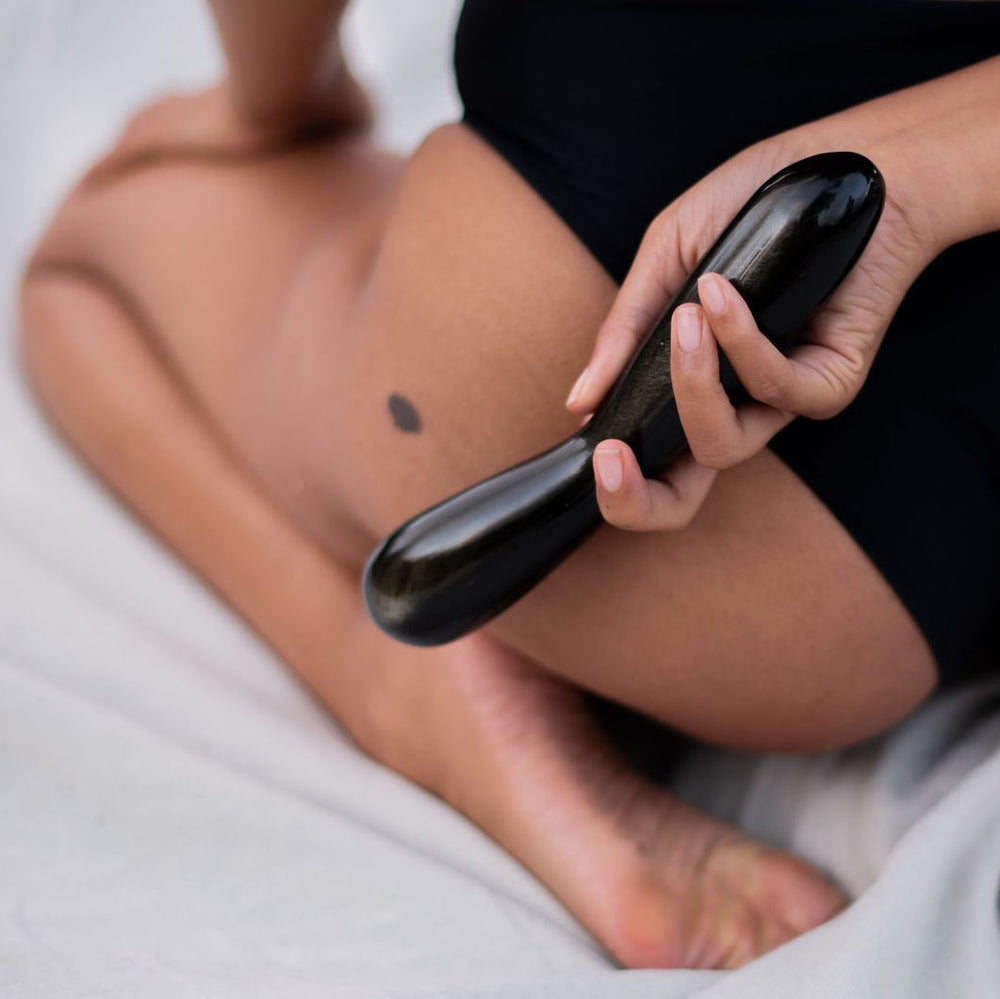What is RBDSM? - Relationships, Boundaries, Desires, Sexual Health, Meaning

Table of Contents
RBDSM means: relationships, boundaries, desires, sexual health, and meaning.
These five pillars shape every part of your sexual experience, whether it feels empowering and connected, or confusing and performative.
Most women are taught how to please, but not how to pause and ask: What do I actually want?
RBDSM gives you a framework to become aware of your needs, protect your body, and create sexual experiences that feel fully yours.
You need to understand what sex means to you, how to hold your own in it, and how to walk away from an encounter knowing you didn’t abandon your body for someone else’s orgasm.
Let’s break down the true meaning of RBDSM.
Relationships: Defining Your Sexual and Emotional Landscape

Your relationship setup directly impacts your sex life. If the container you’re in doesn’t support your full expression, it will never feel satisfying.
Monogamous, poly, situationship, Dom/sub, or solo, you don’t need to fit a mold. But you do need to know exactly what fuels your erotic energy and what shuts it down. Most women never pause to define this. They adjust, they shrink. They settle for “functional” when their body is screaming for something deeper, clearer, or freer.
The first step is to stop pretending. If your dynamic feels murky, performative, or filled with pressure to meet someone else’s needs first, your sex life will reflect it. A lack of relational clarity shows up in the bedroom as low libido, lack of connection, or faking it, physically and emotionally.
Clarity is sexy. When you know where you stand, what you want, and what you’ll no longer tolerate, your body responds. Turn-on happens when you feel safe to be turned on, not when you’re navigating emotional landmines mid-thrust.
Boundaries: The Foundation of Trust and Pleasure

If you want sex that feels connected, safe, and truly satisfying, boundaries aren’t optional, they’re the baseline. Most women were taught that saying “no” kills the mood. But when you don’t speak your limits, your body won’t fully say yes. That’s when numbness shows up. That’s when you start disassociating mid-sex or tolerating things that leave you feeling empty afterward.
Boundaries are how you build safety before you ever get naked. Open communication about your boundaries is essential for creating a safe and satisfying sexual experience. And safety is what unlocks turn-on.
What Boundaries Actually Look Like
Boundaries are in every part of how you relate. You need to be clear in four key areas:
Physical: What’s a full-body yes, and what’s a hard no? This includes specific acts, pressure levels, timing, and even who initiates. If something consistently leads to shutdown or pain, that’s data. Use it.
Emotional: Are you jumping into intimacy while emotionally disconnected? If you’re not being met with presence, aftercare, or emotional responsibility, your pleasure will always feel unstable.
Relational: Do you need exclusivity to feel sexually safe? Do you need honesty about other partners? If the dynamic you’re in makes you question your worth, your arousal will stay locked behind anxiety.
Energetic: Are you over-giving or letting someone access your body when you’re depleted? Sexual capacity isn’t just about time—it’s about bandwidth. If you’re fried, your body will go offline, no matter how much you love the person.
Boundaries must be specific. “I need more connection” means nothing unless you define what connection looks like. Is it eye contact? Is it a 10-minute check-in before touching? Is it no penetration without warming up with oral or sensual massage first? Having a clear conversation about your boundaries ensures that both partners understand and respect each other's limits.
Until your boundaries are clearly defined and clearly stated, you can’t fully consent, and you definitely can’t fully surrender.
Desires: Clarifying What You Actually Want in Bed

Most women have been so conditioned to be desirable, they never ask themselves what they actually desire. There’s a difference between performing arousal and feeling it. One is for show. The other changes everything.
If your sex life feels repetitive, disconnected, or like you’re going through the motions, maybe you haven’t taken the time to explore and fully identify your desires.
You don’t have to want what your partner wants. You don’t have to crave penetration. You don’t need to be kinky, submissive, romantic, or experimental just because the internet told you to be.
But you do need to know:
-
What turns you on mentally, emotionally, physically
-
What you fantasize about but haven’t said out loud
-
What feels like a full-body yes, and what feels like endurance
How to Get Clear on Your Desires
Start with solo exploration.
Slow down. Use your hands, a wand, or even guided audio to test what your body responds to. Notice what creates heat vs. tension. Pay attention to your feelings during this exploration, as they can provide valuable insights into what truly arouses you. Where do you clench? Where do you soften? What kind of touch, soft, firm, rhythmic, erratic, actually feels good?
Then go deeper: What dynamics arouse you? Do you feel more turned on giving or receiving? Being in control or surrendering? Do you want silence, moaning, dirty talk, emotional connection, or a full scene?
Desire isn’t static. It shifts. What worked a year ago may not work now—and that’s not a problem. That’s your evolution. Stay current with your body.
Sexual Health: Knowing Your Body, Owning Your Pleasure

Sexual health isn’t just about STI tests and annual exams. It’s about understanding your body so well that you can recognize when something’s off, and when something’s working.
You should know how your libido shifts across your cycle, how stress impacts your lubrication, and how your body responds to touch, pressure, and rhythm. If you’re disconnected from those cues, pleasure becomes guesswork.
Most women were never taught how to track arousal patterns, vaginal pH changes, or what healthy discharge looks like. That knowledge matters. Not just for preventing infections, but for knowing when your body is asking for rest, hydration, intimacy, or boundaries.
Hormones, gut health, mental health, all of it affects your vagina and your capacity for pleasure. Chronic fatigue, anxiety, shame, and birth control side effects can kill desire without you realizing why. If sex feels dull, painful, or like a chore, don’t blame yourself, investigate your system.
Meaning: The Emotional and Psychological Side of Sex
Sex can be purely physical, deeply emotional, or even a profoundly spiritual experience, sometimes all three at once. Understanding what sex means to you personally can prevent those moments of confusion or regret that come after encounters that just don’t hit the mark. Being clear about what you consider intimate can transform your sexual experiences from random to richly rewarding.
Are you seeking connection, validation, pleasure, or something else entirely? Being clear about this transforms every sexual experience from random to richly rewarding.
Aligning Your Sexual Encounters with Your Values
Too many people find themselves having sex out of habit, obligation, or societal pressure - cue emotional disconnect and disappointment.
Pausing to reflect before engaging in intimacy ensures you're respecting your core values, making each encounter feel truly aligned, authentic, and deeply fulfilling.
You can read about boundaries, desires, and sexual health all day, but until you feel it in your body, nothing changes.
Viva La Vagina 2.0 offers practical, body-based work that makes RBDSM real.
If you’re still experiencing numbness, shutdown, pain during sex, or confusion around what you actually want, this is your entry point. You need direct access to your body’s truth. Moving forward with clear intentions and understanding your desires can transform your sexual experiences.
Inside VLV 2.0, you’ll retrain your body to respond, speak, and receive through guided tools that align with every RBDSM pillar:
-
Boundaries stop being vague once you can feel when your body says no.
-
Desires get clearer when you stop guessing and start touching.
-
Sexual health improves when you learn where you’re holding pain, and how to release it.
-
Meaning comes when sex stops being a performance and starts being a felt experience.
This is where women go to stop tolerating sex that doesn’t work, and start building turn-on, sensitivity, and self-trust from the inside out.
Conclusion
RBDSM is about having sex that actually works for you.
When you’re clear on your relationship dynamics, confident in your boundaries, connected to your desires, informed about your sexual health, and grounded in what sex means to you personally, everything changes.
Pleasure becomes easier to access. Communication gets sharper. The aftermath of sex feels nourishing, not confusing.
You don’t owe anyone performance, silence, or self-abandonment.
You deserve experiences that feel aligned, honest, and deeply satisfying, physically, emotionally, and energetically.
Related Articles

















Leave a comment